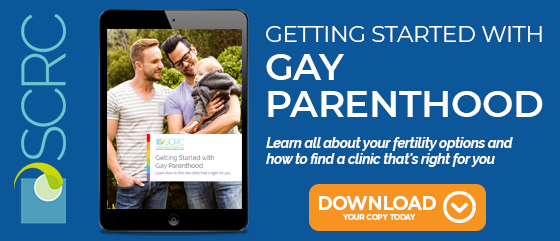
Deciding to have a baby is a big, exciting (and perhaps a little scary) decision. In the LGBTQ world, there’s quite a few options ahead of you, but if you’ve landed on this page, you’re probably at least toying with the idea of surrogacy.
Surrogacy is a big decision with a lot of steps. But choosing the right fertility clinic can make the process easier for all involved parties. So where do you start? What separates the good clinics from the great clinics, and how can you ensure the best process for you and your partner, the surrogate, and your future child?
Not to worry. We’ve outlined some main points to help you get started.
Why choosing the best clinic is important
In general, fertility clinics are also surrogacy clinics. These clinics guide you through the surrogacy process, including medical examination of the surrogate, gamete retrieval, and in vitro fertilization (IVF). They will be your hand to hold throughout this process, so it’s important to choose which clinic is best for you, aligns with your goals, has the best technology and environmental conditions, and makes you feel the most comfortable.
For cis and straight couples, surrogacy is an option usually considered because of fertilization challenges. Because of this, these couple usually has already found their surrogacy clinic!
However, this process is often different for gay, lesbian, or queer couples for whom an egg or sperm donation is necessary. In these cases, it can be very confusing and overwhelming when first stepping into the surrogacy world. Here are some things that can be helpful to consider in your search.
Things to consider
Once you have decided on a general plan with your partner, make a list detailing what your ideal clinic should have. This is your chance to envision your dream clinic. Include everything, and leave no stone unturned.
While some of these are preferences, there’s some specific requirements that your future clinic needs to have to support the health and safety of your child—and these should not be overlooked. We've outlined a couple of those requirements below.
Technology
One of the most important things a clinic should have is advanced technology. Fertility clinics are commonly equipped with a variety of technologies used for Intracytoplasmic Sperm Injection (ICSI), classic IVF, PGD/PGS (genetic screening of embryos), and—possibly—storage and handling of donated eggs and sperm. It’s important to make sure that whichever clinic you choose has the best technology that aligns with your plan. Advanced technology goes a long way towards a successful surrogacy.
Certifications, reputation, and ratings
The ideal clinic should be highly rated and have a fantastic reputation, and medical professionals should be board certified.
Success rates
The average success rate for IVF clinics is about 75%, and rises to 95% after pregnancy. Look for a stellar clinic that is above average—preferably with IVF success rates around or above 80%.
Egg and sperm banks and storage
There are multiple cryobanks out there that work with fertility clinics, but it’s possible that the clinic you might be looking for has a storage facility of its own.
If they work with a bank, make sure to check its ratings. Talk with your partner and decide if you would like to choose a donor or if you would prefer an anonymous donor selected for you.
If you want to choose a donor, it’s possible for the selection process to take place online. Selecting online can make it easier for you to narrow donors down by details like body type, medical history, and religion. If this sounds like a good option, see if the bank has a way to select a donor online.
Regardless of who stores the donated gametes, make sure that they have the proper lighting, temperature, air filters, and technology for correctly storing these delicate cells. Just like clinic technology, the bank should have advanced technology too!
Lab practices and lab environment
Proper lab practices, light, temperature, and handling methods play a surprisingly large role in the success rate of IFV and other methods. Gametes are delicate, and being handled properly—and being provided with the best ambient light, air quality, and temperature for growth—will give your child the best chance for healthy development.
LGBTQ
Working with a clinic that has an established client base within the LGBTQ community is important to the overall experience and comfort level of the entire process. Since the clinic is the one guiding you through the surrogacy process, it’s important to feel comfortable with and be able to trust your doctors.
You might have to call the clinic for this information—but that’s ok! It will give you a chance to evaluate the feel of each clinic while you do. If someone makes you feel uncomfortable, don’t be afraid to cross off that clinic from your list entirely. And if someone is extremely nice, note that too!
Cost
If cost is a factor, see what kind of coverage is accepted by your insurance, if you have it. Some clinics also offer financing, which might be an option if you need some financial wiggle room.
Distance and waitlist
Remember, a great clinic is worth traveling for! While distance can be a factor, don’t let it keep you from a clinic that has exactly what you’re looking for.
Similarly, some of the best clinics might have a longer waitlist. Don’t be afraid to adjust your timeline to accommodate a fantastic clinic with many clients. Although a longer waitlist doesn’t necessarily mean better service, waiting longer for the best of the best will be worth it in the end.
Support
Some clinics provide access to therapists and emotional support. If this is something you’re looking for, know that it can be an option.
Time to ask questions
Now that you know what you’re looking for, it’s time to call and ask questions. This call will also give you a good feel of who the medical professionals at the clinic are and what they stand for.
Here’s some questions you could ask:
- What kinds of technologies does this clinic use throughout the surrogacy process?
- What certifications and qualifications does the clinic/medical professionals have, and are they board certified?
- What are the common success rates?
- How long has this clinic been in business?
- How does this clinic handle sperm/egg donors?
- How long has the clinic been providing services to LGBTQ clientele?
- How much control does the couple have over the surrogacy process?
- What is the air quality like, and are there filters in place to prevent embryos from being affected by VOCs, microbes, perfumes, and other contaminants?
- How closely is the quality of lighting and temperature monitored?
Choosing your surrogacy clinic
Based on the answers to the questions above, you should have a good idea which clinic is right for you.
If you don’t feel like you can decide on a clinic yet, no worries! Ask yourself this question: if you had a friend who was looking for a surrogate, would you recommend any of these clinics based on what you now know? It’s likely that one of these choices will stand out to you for one reason or another.
Sometimes, removing yourself from a big decision is just what you need to give yourself a new perspective.
Share this on social media:






